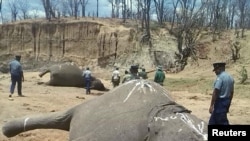U.S. Secretary of the Interior Sally Jewell concluded an official visit to Africa on Saturday with a final stop in South Africa, where she called for international collaboration to combat wildlife trafficking. Jewell is the co-chair of U.S. President Barack Obama’s Task Force on Wildlife Trafficking.
Jewell has already visited China, Vietnam, Kenya, Gabon and Namibia to discuss ways in which the United States and these countries can work together to eliminate the illegal trade.
In South Africa, Jewell toured Kruger National Park, where poachers have killed hundreds of rhinos for their horns.
While there, they saw a white rhino bull that was shot and killed by poachers for its horn. Its carcass later became food for vultures.
Jewell, appearing distraught, watched as the park’s forensic team took DNA samples and other evidence that could help them if the poachers are caught.
“It’s a sad scene and it’s a scene that is frustrating as I think that South Africa has done such a good job in bringing the white rhino back from the brink of extinction. So to see a white rhino in this condition, it’s difficult,” said Jewell.
South Africa vows to eliminate poaching
Her South African counterpart, Minister of Water and Environment Edna Molewa, said the country’s spirit is not broken and pledged that victory is certain.
“Giving up is not an option. We have to fight this battle and we have to win,” Molewa said.
The park’s senior investigator, Frik Rossouw, said gathering evidence is the most difficult part, considering there are no witnesses when such killings take place.
“In this environment it’s not easy to find exhibits. They do not show themselves to you in the bush. You must interpret what happened and from there try and find evidence.
“We were lucky we found three spent cartridges, which we hope will link us to a weapon and suspect one day,” said Rossouw.
Jewell urged the world to fight wildlife trafficking in all its forms.
“We need the world to see this kind of thing so that they actually take action and also recognize that the only value of rhino horn is on a live animal, otherwise it is valueless,” she said.
Collaring of a rhino
Secretary Jewell and her team also witnessed the collaring of a rhino and attachment of a microchip to the animal. These devices are fitted to the rhino to monitor its movements.
Markus Hofmeyer, general manager of veterinary services at the park, said they are employing every measure that can help them save the animals' lives.
“This is a horrible situation for most of the staff in conservation areas. None of them came here to fight a battle like this. For us as vets, there is nothing as bad as having to euthanize a wounded rhino.
“Those things eat at your emotions and we do get strained and stressed by these things,” Hofmeyer said.
US donation
During her visit, Jewell donated several pairs of night vision goggles to help rangers identify poachers at night. This was part of a $750,000 U.S. donation.
South Africa is home to 22,000 white rhinos, the world’s largest rhino population. More than 9,000 of these are housed in the Kruger National Park.
Poachers killed more than 1,000 of them in 2015 alone. South Africa has now resorted to using both ground and air rangers to protect the rhino and hundreds of other wildlife species from the dangerous and heavily-armed poachers.
Rangers vow to soldier on
Carl Ubise, ranger for the park's Skukuza Section, said he is willing to risk his life for these animals to live.
“I will continue doing this job as long as I’m alive and breathing; I will carry on protecting this asset because it belongs to everybody. It’s not only for us Africans but for the whole world,” Ubise said.
South Africa’s endangered species list includes the African elephant, African lion, cheetah and the black and white rhinos.
Despite the high number of rhino deaths, South Africa says the fight against rhino poaching is a war that the country is not prepared to lose. Experts, however, say if the current trend continues, deaths might overtake births. If that happens, they say, the country might as well bid farewell to its last rhino.






